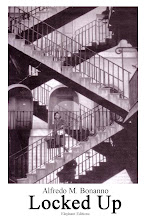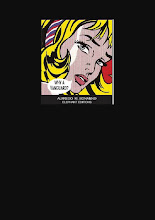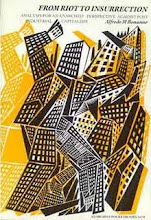The broad concept of illegality
Simply spreading information that has been distorted or kept quiet by the institutions and the media is “illegal”. It does not go against any precise law (except in cases of information protected by “State secret”), but is contrary to the State’s management of social control, of enforcing the law.
So a wide range of activity exists that attracts the attention of the State’s repressive organisms to the same extent (if not more) as behaviour that actually breaks a precise law.
At certain moments the circulation of information can be very damaging to projects of State control, at least (if not more) as much as action considered by the law as crime.
It derives from this that the difference between the “formal” line of illegality and the “real” one fluctuates according to the repressive projects of power.
So State and capital both nationally and internationally determine levels of illegality—or if you prefer a limit of ‘legality’—fixed not so much through recourse to precise laws (the law acts in given cases), but with an intricate practice of control and dissuasion that only at certain moments becomes actual repression as such.
The politics/legality relationship
Basically, all political critique is within the terms of legality. In fact, it strengthens the institutional fabric by allowing it to overcome defects and delays determined by the contradictions of capital and some excessively rigid aspects of the State.
But no political critique can go as far as to reach the absolute negation of the State and capital. If it were to do so—as happens with anarchist critique—it would be a question of social critique, so would not be considered a constructive contribution to the institutional fabric and consequently become—in fact—“illegal”.
Social and political situations can arise in which greater equilibrium between the political and economic forces make it easy for a social critique, even a radical, anarchist one, to be recuperated. But that does not alter the substantially “illegal” content of this critique.
On the other hand, even behaviour that falls quite outside the law can be considered differently in the light of determined political situations. For example, the armed struggle of a combatant party is undoubtedly illegal behaviour, but at a given moment it can turn out to be functional to the project of recuperation and restructuring of the State and capital, an eventual agreement between combatant party and the State is not impossible (the latter in its guise of guarantor of the privileges of capitalism).
This is not as absurd as it seems in that the combatant party places itself in the logic of destablising the ruling power in order to construct a power structure that is different in form but identical in substance. In this kind of project, as soon as it is realised that the military confrontation cannot proceed because there is no outlet in the medium term they come to some agreement. The amnesty being discussed in the [Italian 1970s] movement is one of these possible agreements. Other forms can be imagined in the light of the recuperation by social democracy. A cohabitation as a result of the military defeat that seems the only possible solution to those who yesterday were convinced they could take over the old power structure and manage it completely.
As you can see, whereas simple anarchist critique—radical and absolute—is always “illegal”, even the armed struggle of the combatant parties can sometimes enter the domain of “legality”. That proves once again the “fluctuating” concept of legality and the State’s intention to adapt this to the conditions of control.
The exercise of control
The instruments of repression are only in minimal part related directly to repression as such. Most of them function as preventive instruments of control.
This consequently has an effect on all potential forms of illegality—through a series of measures—and on all forms of different behaviour. Potential illegality is within the law today, allowing the far-seeing eye of the censor to calculate a possible outlet. The same goes for “different” “deviant” behaviour (a move away from that imposed by the producers of consensus), today a possible object of study or wonder, but real danger points of social subversion in the future.
Now, the exercise of control is based on the accumulation of data: behaviour, deviance, taste, ideology, actions, etc. The greatest amount of data possible and its relative elaboration is at the root of any extensive project of control. Without these elements the latter would not be possible, it would be circumscribed and not very dependable in the wider, participatory perspective of control.
Space of secrecy
Contrary to the opinion of some—who maintain it is pointless—I consider secrecy to be one of the essential elements of revolutionary action.
But this concept must be gone into.
In the first place the idea that one can only think of secrecy in the eventuality of clandestine action.
Secrecy is also indispensable in the activity of counter-information, activity aimed at intermediate struggle. In fact an intermediate struggle, for example, a factory occupation, is not the “real” aim of anarchists, this comes afterwards in the consequences that might develop. These consequences cannot be foreseen during the work of counter-information and, in the narrow sense, are not part of the intermediate action, but belong to a successive phase which can only with difficulty be grasped by those who participate in the struggle simply to satisfy a primary, immediate need.
Secondly, even if we take it for granted that the repressive forces will come to know every aspect of our struggle—from the phase of counter-information to the successive one—that is no reason for not adopting the method of giving as little information as possible to the enemy. Doing things in the light of day does not mean that we supply explanations of everything for use by the police. Think, for example, of a situation where many actions take place in different places simultaneously. By taking care of the communication aspect (leaflets, posters, papers, etc.) one can make it more difficult for the police to discover the relationship that exists between these actions. This is a question of simple caution in order to delay repressive action.
Educating oneself to care and prudence is therefore fundamental for every revolutionary no matter what action they intend to carry out. If we stop to think about this for a moment, even when simply drawing up a leafletwe can easily work out safeguarding techniques that should be used so as to avoid aspects of repression . On the other hand, knowledge of these techniques allows us to use instruments of denunciation or contempt at opportune moments when we consider it important in such a way that the risk involved becomes a calculated risk not a simple error of the pen or ideas, to be regretted immediately afterwards.
As we can see, the space for secrecy is wide and goes far beyond the realm of clandestinity.
The anarchist movement and the problem of secrecy
To say that the anarchist movement is by nature not a clandestine movement is meaningless. A revolutionary movement as complex and rich in elements for the radical transformation of society cannot fail to be thought of as anything other than an intervention that is realised in the light of day so that everyone has the chance take its ideas into consideration.
The fact that the anarchist movement has at times been reduced to clandestinity depended exclusively on altered historical and political conditions in a given country.
But that does not prevent the anarchist movement from developing its political and revolutionary activity with the caution mentioned earlier. It also develops more specific activity that is not aimed at propaganda and participation in social struggles, but has different objectives that are—obviously—not in contrast with the first. In the first place, the problem of finding the means necessary for the struggle. In the second, attacks against objectives and individuals actively involved in exploitation, and so on.
This kind of activity cannot be considered as something “different” or “separate” from the rest. The need for secrecy, which seems out of the question as far as these aspects are concerned, leads those who believe secrecy is impossible to conclude that all such activity must be abandoned, thus sacrificing a potential that continues to reduce everything to simple declarations of principle and a sad inadequacy of means.
Technology and secrecy
But do the potent technological means the adversary is doted with really make secrecy impossible?
This question enters the field of perplexities that have been generated over the past few years due to a lack of knowledge of technology and a fantastic and hyperbolic view of its possible use.
Like everything else one does not know, or that one knows little about, the technology of the past few years with its computers, automatic listening centres, lasers, radar, etc. has fascinated many comrades who were once nearly all passionate readers of science-fiction. The pleasures they once found in such reading is now found in reading, often without a necessary basic preparation, more or less specialised newspaper accounts (more often simply “scandalistic”), of the great possibilities of technology today.
We are not trying to underestimate the repressive potential that the technical findings of today are putting at the disposition of power. We just want to say that certain things should be said with caution. If for no other reason than not to undo people’s subversive energy and contribute to hammering nails into our own coffin.
Total control is a dream that power has been passing on since the era of the great Leviathan. In actual fact this is impossible. The main obstacle is not so much lack of technical efficiency concerning the mechanisms of control and not even the limitations of those who have the task of making it work. The limitation of control is that, in order to extend, it must penetrate the mind of whoever is being controlled. So the real controller is not so much—or at least not only—the policeman, the judge or the prison guard, but the person that is being controlled him or her self.
Whoever realises control plans to enter the culture of the person they are controlling, building within them a resistance to freedom, obstacles to the subversive struggle, impediments to free thought. Once that is done it will be the controlled person to censure their own actions and thoughts. Finally, in a third phase the controlled person will see to extending control, to perfecting it by participating in the elaboration of technological centres for storing data and the elaboration of information. This participation, which constitutes the maximum level of control imaginable, will only become possible when the first two levels have been interiorised (control seen as the enemy and control penetrating us as a way of thinking). The third level should not be seen as participation in the functioning of “machinery” so much as an ongoing contribution to enriching the information available to capital and which constitutes the base of capitalist accumulation of the future.
In such a perspective clearly any sector that is removed from the reaches of control or protected from the spreading process of cultural integration must be defended with every means, even by having recourse to the techniques of depistage that are based on secrecy.
Anyone who denies such techniques a priori does so because they short-sightedly see them as plots and romantic nonsense of days gone by. This is not so.
Of course, it would be absurd to entrust messages to a ciphered code, not only of the kind used by Bakunin and Malatesta but any kind at all, for the simple reason that any communication that is more than a couple of lines long can easily be decoded by any computer. But even the code of Bakunin and Malatesta (for messages of a few words) still holds and cannot be decoded by computers because they lack the necessary frequency to establish the various characters.
I am not discussing the question of coded messages here, I am just saying that no one can exclude that at a given moment a revolutionary might be forced to make a communication that they do not want to make known to the enemy. It is as well to know that such a thing is possible—if the message is very brief—and that no technology in the world that can break even the most simple codes.
Why open the way to repression?
Those who consider secrecy to be impossible maintain that all anarchist and revolutionary action should be publicised to a maximum degree. For example, for them there would be nothing strange about publicising lists of those belonging to all the anarchist organisations (beginning with the FAI, [Italian Anarchist Federation]: precisely these comrades publish the names of the members of that organisation).
On a purely abstract level there would be nothing strange about this. But in practice many objections to such an idea arise. First, why open the way to the repression? Second, if anarchists are tolerated today within a certain repressive perspective, tomorrow this could change for the worse, and the police would already find themselves with well drawn-up lists to facilitate their task. Why should we help them in their job of policing? Of course, many comrades’ names are already known, but many others are not and the police go to great lengths to find them out. Some innocent soul might ask themselves why they bother, given that the work of the movement —in the main part—takes place in the light of day. But that would be a stupid question. Accumulating data today could be useful to the repression of tomorrow.
The function of secrecy
When we see that control is not just a repressive fact but is also, and often essentially, participatory, it is possible to evaluate the problem of secrecy differently.
Basically it is we ourselves who by “participating” could end up sanctioning definitive real control. If we refuse to collaborate, if we obstruct the creation of a ghetto culture with all possible means, a language for the exclusive use of those who are and will be excluded from the technological management of production, therefore of power, then real control will not be possible.
It is not so much the problem of considering today what margins the State conserves from so-called “not applied control”, i.e. of the capacity it could employ—also preventively—but doesn’t, so as to give the impression that at least there is an area that is devoid of control. In substance, this area might exist, it might not. It is social control as a whole that is not yet total. Even that which looms up before us—prisons for example—are still incomplete control. It follows that it is not a question of the extent of control, but of the quality of the control itself.
The function of secrecy in subversive behaviour could therefore be that of denying this participation, avoiding interiorising the values and language that the State is transmitting with the aim of perfecting control.
skip to main |
skip to sidebar

Some writings of Alfredo Maria Bonanno in English, or almost

Alfredo Bonanno was arrested on October 1st 2009 in Greece, accused of concourse in robbery. With him, anarchist comrade Christos Stratigopoulos.
Here are a few translations and part translations of a small portion of Alfredo's writing. This is a work in progress, many of the translations are as yet incomplete. Open links to find more of Alfredo's work.
Alfredo Bonnano Released
Nov. 22 Alfredo Bonnano was sentenced to 4 years imprisonment (which practically means that with the time served so far and the fact that he is over 70years old HE IS RELEASED
Christos Stratigopoulos (who took responsibility for the action)
was sentenced to 8 years and 9 months with the Greek law will probably be released at the end 2011
BY ANY MEANS NECESSARY
LINKS
click on any of these labels to read text
- "Community" sickness
- 1981 - Editorial
- A Critique of Syndicalist Methods
- A few notes on Sacco and Vanzetti
- A few notes on the revolutionary movement in Italy
- A little man in Singapore
- A million jobs
- A question of class
- Affinity
- After Marx autonomy
- Albania Laboratory of Subversion (Introduction)
- Anarchism and the national liberation struggle
- Anarchists and action
- AND WE WILL ALWAYS BE READY TO STORM THE HEAVENS AGAIN (Against amnesty)
- ANTI-INSTITUTIONAL MOVEMENT
- Are we modern?
- Armed Joy
- ARMED STRUGGLE. SOME REFLECTIONS.
- Autonomous base nuclei
- beyond syndicalism
- Beyond workerism
- But what is the imaginary?
- Class War
- Comiso - Organizational document of the self-managed leagues
- Considerations on illegality
- Dissonances (Introduction)
- Elephant Editions 1986
- Excluded and included
- Farewell to claiming
- Feral Revolution (Introduction)
- FICTITIOUS MOVEMENT AND REAL MOVEMENT
- For an Antiauthoritarian Insurrectionist International - Proposal for a debate
- From riot to insurrection
- From the centre to the periphery
- Good technology
- Guerilla Extraordinary
- Habits and idols
- Hegel
- I know who killed chief superintendent Luigi Calabresi
- Illegality
- Illness and capital
- Informal organisation
- Insurrection
- Internationalism
- Introduction to Sabate
- Introduction to Anarchism and Violence
- Introduction to Bratach Dubh English edition of Malatesta's Fra Contadini
- Introduction to Insurrectionalist Anarchism
- Introduction to Strange Victories
- Introduction to The Conquest of Bread
- Involuntary aspects of voluntary work
- Let's destroy work
- LET'S DESTROY WORK. New introduction
- Let's keep our feet on the ground please
- Lightening Conductors and Stand-ins - more shots of non-news
- Lightning Conductors and Stand-ins
- Lightning Conductors and Stand-ins (cont.)
- Locked up
- Looking forward to self-management
- Loss of language
- More on internationalism
- National Liberation Struggle
- nineteen years on
- No more crises
- Non-news about drugs
- Non-news about racism
- Ode to the Uniform
- On Feminism
- One's life on the line
- Order and chaos
- Otto Ruhle (Introductory Note)
- OUR ROLE IN THE PRESENT CONFLICT
- Palestine mon amour
- Pantagruel anarchist review
- Pinelli
- Prison and Prisoners’ Struggles - Introduction
- Propulsive Utopia
- Quality and the factory
- Restructuring Capital and the new democracy
- Revolution - Violence - Antiauthoritarianism
- REVOLUTIONARY VIOLENCE
- Science and the social revolution
- Self-management
- Severino Di Giovanni in Argentina 1923-1931 by Osvaldo Bayer
- Social banditry
- SOME NOTES -
- Space and Capital
- Stirner
- Stop the City? From information to attack
- Strategy and Methods
- Streamlined production
- The "end" of the crisis
- The aesthetics of anarchism
- The anarchist tension
- The area of autonomy and the anarchist movement in Italy
- The armed wing of science
- The Cruise missile base at Comiso can be prevented
- The ethical bank
- The insurrectional project
- THE LANGUAGE OF TECNICS -
- The logic of insurrection
- The moral split
- THE NECESSARY DESTRUCTION -
- The priority of practice
- The refusal of arms
- The revolutionary project
- The revolutionary struggle
- The significance of an insignificant event
- The struggle for self-managed social space
- The tyranny of weakness
- The whole and the part
- The young in a post industrial society
- Theory and action
- Towards anarchist antimilitarism
- TOWARDS THE GENERALISATION OF ARMED STRUGGLE
- TRANSFORMATION IN THE WORLD OF WORK AND SCHOOL -
- TRUTH -
- Unemployment in Italy - How come everything doesn't explode?
- Untitled
- Violence and non-violence
- What are anarchists
- What can we do with anti-fascism?
- Why a vanguard?
- Why Insurrection
- World domination in a few words











